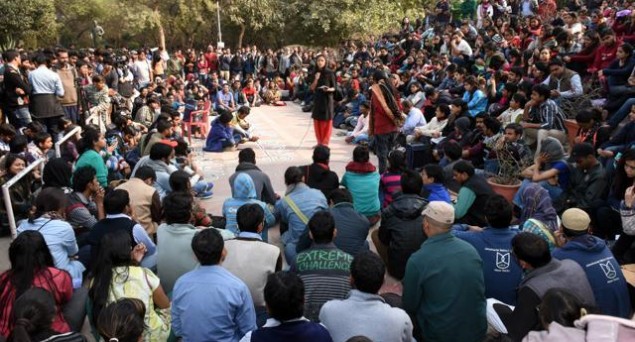It is clash of ideologies at JNU

Talat Khan,
New Delhi, Feb 18: The Jawharlal Nehru university professors would be organising open lectures on nationalism daily for the next 10 days, starting Wednesday. Many Delhi University lecturers have also volunteered for these lectures.
That is a sensible and important step by the JNU faculty. The decision had been taken on Monday, the day when a crowd of lawyers attacked the JNU students and faculty members who were waiting for JNUSU president Kanhaiya Kumar to be produced before the court. The lawyers called them anti-national.
And that is where the whole issue hinges. Who is nationalist and who is anti-national? Or how to define Indian nationalism?
"They can't teach us what nationalism is. Our nationalism is not the nationalism of Nathuram Godse, our nationalism is that of Mahatma Gandhi and Babasaheb Ambedkar," Rohith, a JNU faculty member, told a gathering of students and teachers at the university admin block on Monday.
On the same day, outside the university's main gate, the Hindutva heroes were spitting venom in their typical uncouth style.
"Rahul's mother needs to answer the nation what the definition of nationalism is. They live on India's money and praise Pakistan. All those who are supporting these anti-nationals should also be punished," Vishwa Hindu Parishad (VHP) leader Sadhvi Prachi said.
Her words infused a fresh fervour in the ranks of Akhil Bharatiya Vidyarthi Parishad (ABVP) agitators who were protesting there against an event in support of Afzal Guru.
Though inadvertently, but the VHP leader somehow caught the crux of the matter in the whole imbroglio: What is nationalism?
The answer to that question may vary widely depending upon your understanding of the concept. And the different interpretation of nationalism is actually the apple of discord.
The Hindutva agitators defined their nationalism through the slogan "Agar Hindustan me rehna hoga, vande matram kehna hoga".
The crowd at the administrative block, on the other hand, espoused a different kind of nationalism. As Nivedita Menon, a senior faculty member at JNU puts it, "A nation is a daily plebiscite."
The JNU has always been seen as a bastion of the free thinkers, the place where scepticism is the norm and where norms are questioned on a daily basis. It is the place where the eateries and tea stalls are the hubs of intellectual discussions, and not just petty politics a la many other reputed universities.
"We have nurtured this culture very fondly through the years and we are proud of it," said Menon, a faculty at School of International Studies.
"We don't say 'Kashmir hamara hai, lekin Kashmiri hamare nahi' (Kashmir is ours but Kashmiris are not). We don't want just the land, we also want to own the people, be it Kashmir or north east," she added.
As the fight continues (in BJP's words 'between the nation and the anti-nationals') people on both side of the divide claim to fight for "the soul of India".
Meanwhile, the government has refused to review the serious sedition charge invoked against a poor student leader because, in MoS for Home Affairs Kiren Rijiju's words, they have "some intelligence inputs" on "behind the scene activities" of these students.
On Wednesday, there was an encore of Monday's attacks on journalists by the lawyers at Delhi's Patiala House court. This despite Supreme Court's order for tightened security at the lower court where Kanhaiya's case is being heard. The police again played mute spectators to the "nationalist" lawyers' aggression.






You might like
Leave a Comment
Your email address will not be published.